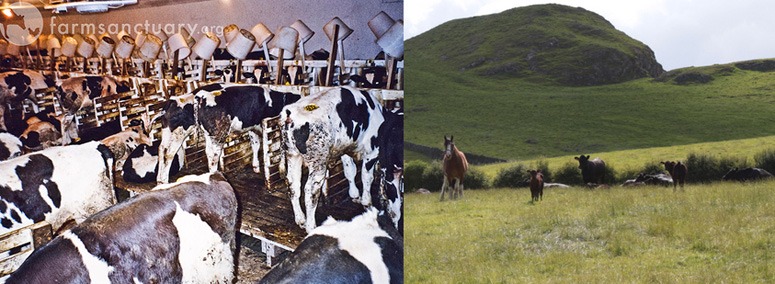
Industrial factory farming and organic farming: which would rather consume? (left image courtesy farmsanctuary.org)
For reasons of unblinking short-sighted dumb stupidity, the UK government continues to support science-based agri-business – and to do its best to kill off organic farming. The UK Food Standards Agency (FSA) commissioned a group of researchers to collate the research of other people who had found that organic beef , for example, has few nutritional advantages over inorganic beef. If they can’t tell the difference between the two approaches shown above, the fault lies with their researchers and their taste buds. Future government report is expected to prove that haute couture clothing has no medical advantages over bargain basement clothing and expensive perfumes do no more for your sex appeal than cheap perfumes. Then we will have reports to establish that the differences in flying time London to New York, business class and economy class on the same plane are ‘statistically insignificant’ and that Dyson vacuum cleaners are no better than Hoovers.
The DEFRA blockheads should remember how their friends in government wrecked the UK’s car producers: they poured in government money to support cheap, shoddy, rust-prone ‘volume’ car producers. In fact, the only hope for a country with expensive land and labour was to concentrate on low-volume high-quality cars. That is why the racing car end of the industry is the only remaining fragment of UK-owned car production. The best long-term policy for UK agriculture is to become a producer of high-quality organic produce with superb animal welfare standards and a glorious reputation. The UK is an island with a very beautiful agricultural landscape. We should become an organic-only food producer, banning all use of GM products. Still trying to ‘beat the world’ one suspects DEFRA of not having noticed that the UK is a group of islands which CAN remain GM-free and which COULD charge a substantial premium for higher quality products. If the UK could also be a low-cost producer, so much the better. But the emphasis should be producing the highest quality food: no factory farming, no GM crops, minimal pesticides, minimal antibiotics, minimal inorganic fertilizers. Hilary Benn should be kept in a veal cage and fed with the cheapest burgers on the market until he repents and recants – or resigns.
Note Hilary Benn became Secretary of State for Environment, Food and Rural Affairs DEFRA in June 2007 and spoke in favour of what the UK press calls Frankenstein Foods (ie genetically modified GM foods) in August 2009. Never mind the science: look at the business opportunity!

Perhaps combining organic farming with tourism a la New Zealand might be worth considering. [http://www.wwoof.co.nz/farewell.php]
Yes! New Zealand is already the best example for the developed countries of how to run an agriculture policy. Like Britain, it would do well to say ‘organic only’, for commercial reasons if nothing else.
Dickson Despommier from the Department of Environmental Health Sciences at Columbia University is proposing Vertical Farming as the solution to land shortage, increasing incidents of disease and land clearing amongst other environmental harms.[http://gliving.com/organic-farm-skyskrapers-is-this-our-future/].
I am doing a school project on organic farming and I have found this both educational and entertaining. What the school tells us appears to be ‘misinformed’ or basically a load of bulls**t but looking into independeant reaserch i have found that DEFRA is not a help for the uk’s Oraginc Agriculture but more of a hindrance as you have expalined. Thanks for your help.
DEFRA appears to be looking ever-backward to the world wars of the past century. So they see a strategic capacity for the UK to feed itself as the prime goal of agricultural policy, more important even that the economic prosperity of UK agriculture or the quality of food produced in the UK. And one other thing: they want the UK agriculture to be dependent on the enlightened guidance of civil servants – or so it appears to me!
Pingback: The economic, asethetic and landscape case for the UK adopting a sustainable GM-free organic agricultural policy | Garden Design And Landscape Architecture Blog – Gardenvisit.com